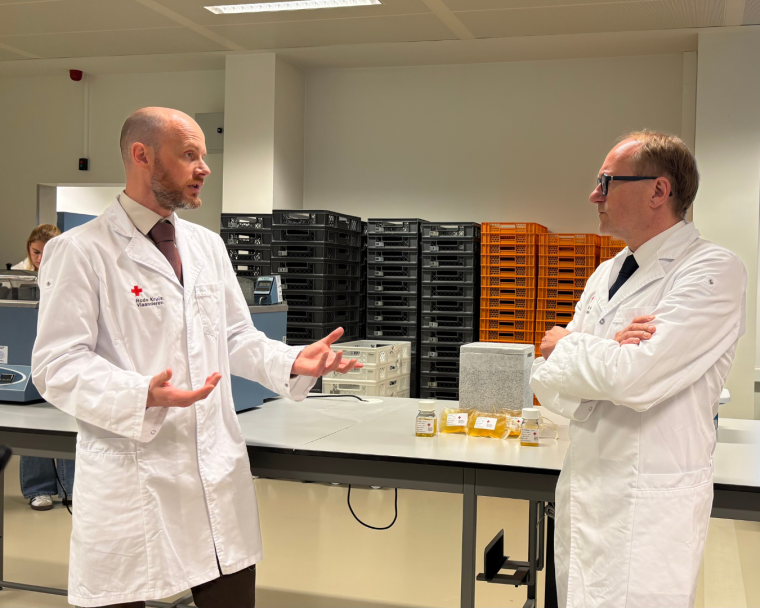Belgian Red Cross-Flanders has breakthrough to recycle expired platelets into animal-friendly biotech product

Belgian Red Cross-Flanders developed a method to recycle expired platelets into an important biotech product. It involves a special growth serum, which is currently produced by heart punctures on millions of calf fetuses. That method not animal-friendly and very controversial, but the growth serum is important for more and more medical innovations. Ranging from vaccine production to cell & gene therapy. Belgian Red Cross-Flanders now kills two birds with one stone: they have a solution for platelets that otherwise have to be destroyed and they provide an animal-friendly alternative for an important biotech product.
"Belgian Red Cross-Flanders is setting a good example with this innovation, by not only being good to people, but also to animals," said Flemish Minister of Animal Welfare Ben Weyts. "It is our damned duty to effectively avoid avoidable animal suffering as well. In Flanders, we are fortunately not only a pioneer in animal welfare, but also in biotechnology."
Attested growth serum is of great importance
In the coming years, demand for growth serum for vaccine production and cell & gene therapy, among others, is expected to continue to rise. Serum (contested) is also important in applications such as stem cell transplants against diseases such as Crohn's or in treatments for eye diseases. Also in regenerative medicine - a growing branch in the medical world - growth serum is used to repair or replace damaged tissues and organs. Scientists grow human cells for this purpose in the lab to form new tissues or organs; it is this cell culture that needs the (contested) growth serum.
The growth serum itself today comes as a byproduct of the meat industry in South America. In pregnant cows, the fetus is removed after slaughter and blood is taken from the fetus through a heart puncture. Slaughtering the mother causes the calf to die from suffocation (lack of oxygen), the blood is then used to produce the serum. There are many ethical as well as medical concerns with this method. After the Covid-19 pandemic, people are increasingly wary of the possibility that infectious diseases can spread from animals to humans. However, the serum continues to be used very frequently because alternatives are limited.
Recently, Belgian Red Cross-Flanders developed an innovative and animal-friendly method to obtain an alternative serum from expired human platelets, which are no longer suitable for transfusion.
An innovative and animal-friendly alternative
"In the biotech sector, people have been looking for an alternative for some time, but it is in limited supply today. However, we know that platelets that we collect from humans are full of the nutrients that are useful for growing up cells." explains Professor Hendrik Feys, Director of Scientific Research Belgian Red Cross-Flanders, "Platelets have a limited shelf life after collection, and it is inevitable that a small percentage will be lost. In the lab of Belgian Red Cross-Flanders , we have developed a new method to make a serum (Human Platelet Lysate) from those platelets that is an alternative to fetal calf serum."
A number of labs and companies worldwide are already producing some kind of serum from platelets today. This production is completely dominated by players in the United States, and their method of making serum from platelets is struggling with European blood.
"In Belgium and most European countries, blood products are often treated differently after donation than in America. This makes the method used in America to make the serum unsuitable for blood products from Europe. We have developed an innovative method that accommodates that problem as well. This also allows us to build strategic independence from the American market." explains Professor Feys.
Human and animal lives
Belgian Red Cross-Flanders has patented its innovative method in several countries. "We do this because it is important to us that potential revenues from our method are maximized to help people." points out Professor Feys.
Today, Belgian Red Cross-Flanders collects 35,000 platelet donations a year. Platelet transfusion is important for stopping or preventing bleeding in various diseases. However, platelets have a limited shelf life of five days. "That makes it inevitable that we have to throw away some expired platelets every year. We started thinking creatively how to avoid this waste, resulting in this new method." says Professor Feys.
"We only use expired platelets. In Flanders that number is limited because we are strongly committed to avoiding decay, but across Europe we are quickly talking about large volumes." Professor Feys further explains, "We are having conversations today with several biotech players who are interested in our animal-friendly product as well as with players in other countries to see how we can better recycle expired platelets."
"Less animal suffering, more innovation. Fantastic that Belgian Red Cross-Flanders is pioneering animal-friendly biotechnology." says Flemish Minister of Animal Welfare Ben Weyts."We in Flanders are not too shy to take a pioneering role internationally as well."
Additional info:
In Flanders, about 3-5% of platelet products expire due to the limited expiration date, across Europe it is about 10%.
